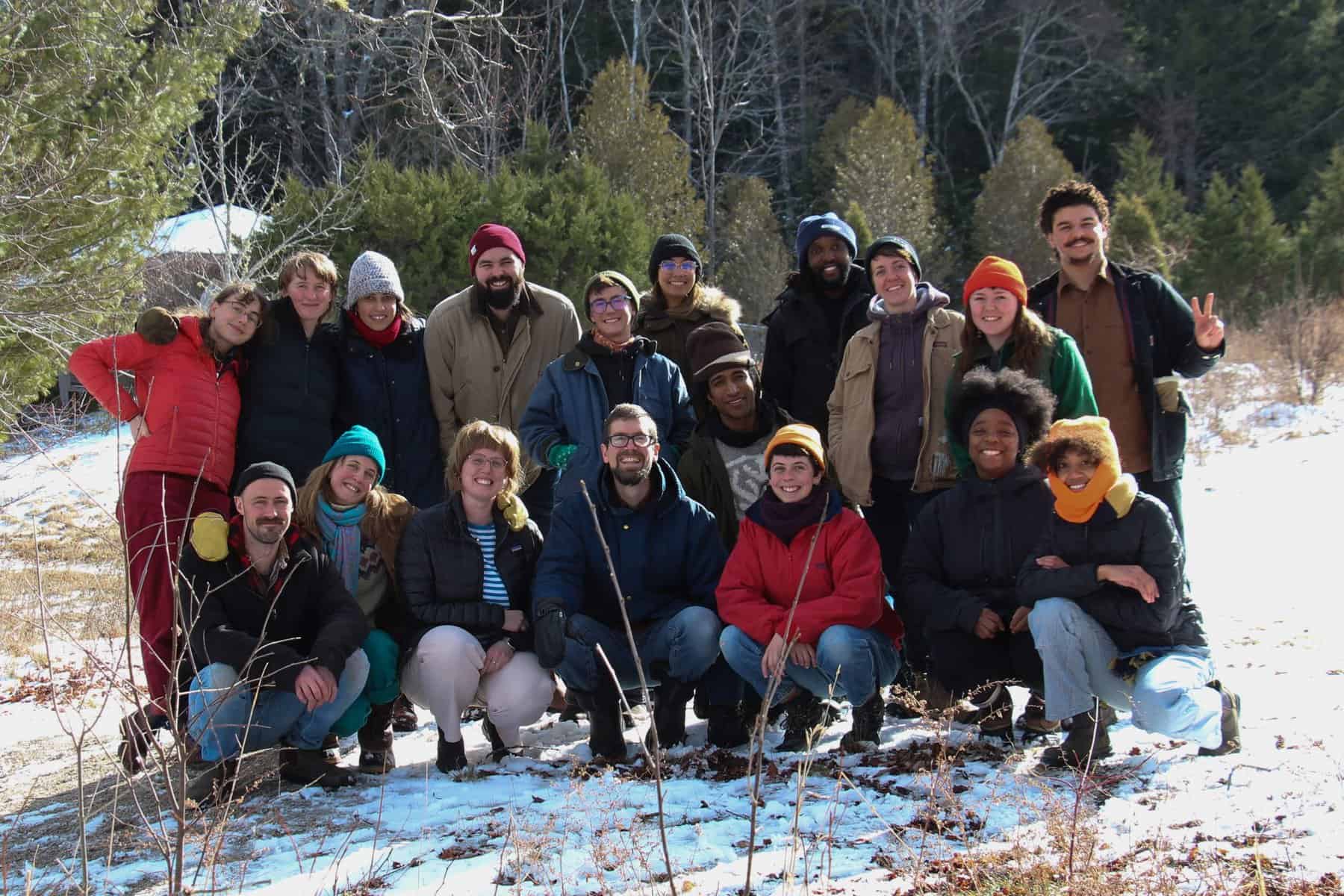Young Farmers Gather for A More Just, Sustainable Food System
Wentzells Lake, Nova Scotia – This past February, 18 National Farmers Union (NFU) Youth members from across the country convened for three days of political education, relationship building and strategic planning. The retreat took place at Asitu’lɨsk, formerly known as Windhorse Farm, an education centre and organic farm with 200-acres of sustainably managed old growth forest, winding streams, and riparian habitat in Mi’kma’ki. The purpose of this retreat was to provide attendees with an opportunity to foster new relationships, and to establish the NFU Youth Caucus’ current priorities and future actions. By the end of the retreat, those in attendance had shared knowledge, gained new skills and inspired the confidence necessary for effective advocacy work at the local, regional and national level.
“I’m thrilled that after years of ‘zooming’ we had an opportunity to gather and connect in person. There is so much youth engagement in the Union right now, having a chance to reflect on our involvement, build relationships, and strategize for the advancement of our priorities as young and new farmers and farmworkers was much needed. The momentum is growing, and I’m so inspired by the knowledge and ingenuity of young NFU members today. I’m excited for what’s to come – we are really shaking things up”, said NFU Youth President, Jessie MacInnis.
The first day of the retreat saw participants deepening their understanding of the NFU. Former NFU president Nettie Wiebe, provided an insightful and comprehensive overview of the NFU’s history, including its formation, major political battles, and ongoing international solidarity work with La Via Campesina (LVC).
Wiebe’s experience and knowledge was further contextualised during a peer-to-peer knowledge sharing session facilitated by current NFU Youth President, Jessie MacInnis and Climate Committee Chair, Stuart Oke. That afternoon, participants learned from Stuart, along with former NFU Youth President Ayla Fenton, how the practice, science, and movement of Agroecology is deeply ingrained in the local and global struggle for Food Sovereignty.
“I think one of the NFU’s great strengths is its ability to foster connections and knowledge-sharing across different regions, sectors, and generations. The NFU has a rich and storied history and, as youth, there is plenty to learn from the battles of the past as we fight for a food system rooted in social and economic justice, as well as environmental sustainability.” – Ari Westhaver, Region 8 Coordinator
The second day of the retreat was dedicated to an interactive strategic planning process. During these sessions, participants discussed the Youth Caucus’ past work, were given an overview of its current projects and began developing a vision for future progress. As part of this process, participants identified four major areas of work that the Youth Caucus would like to focus on over the coming years. These areas included:
- Storytelling and Creative Communication
The development of member engagement material that represents NFU policy in creative ways. Eg., zines, short stories, film, etc. - Continuing to grow a Culture of Belonging in the NFU
The NFU Youth are committed to creating an organizational culture that welcomes and supports the diversity of experiences and backgrounds of our members. We are going to expand upon existing efforts underway across the NFU to foster safer, inclusive spaces and organizing structures that make everyone feel encouraged to share and learn together. - Onboarding and Engagement of Youth Members
Providing youth members with a platform to build the knowledge and confidence necessary to engage with the NFU and its work through ongoing training and mentorship opportunities. - Providing a Youth Lens to all NFU work
Ensuring that the NFU Youth Caucus is actively engaged with all facets of NFU work through supporting youth member participation on all committees, working groups, and boards.
Within these major areas of work, attendees identified a number of short, medium, and long-term goals, including the development of accessible onboarding resources for new youth members and ongoing intergenerational knowledge sharing. Attendees also felt strongly that a key component to the success of all four areas of work will be ongoing paid staff support and the maintenance of strong interpersonal connections through regular in-person gatherings. Afterall, the fruits of our labour are far richer when we connect beyond the screen.
The final day of the retreat was spent wrapping up the strategic planning process and welcoming farmers of all ages from across Nova Scotia into the space for a visioning session led by Engage Nova Scotia. Together attendees and local farmers envisioned the characteristics of a just and sustainable food system and brainstormed ways to achieve this vision. The results of this collaborative engagement process will be used to inform Engage Nova Scotia’s future efforts to work with farmers to improve the province’s food system.
In the coming months, the Youth Caucus plans to hold monthly meetings to begin operationalizing the short and medium term goals within each major area of work identified in the strategic planning process. These goals include, planning ongoing opportunities for social connection, and knowledge-sharing, as well as developing onboarding materials to support new youth members in their engagement with the NFU.
If you or someone you know would like to get involved with the NFU Youth Caucus, please email NfuYouth@nfu.ca.
